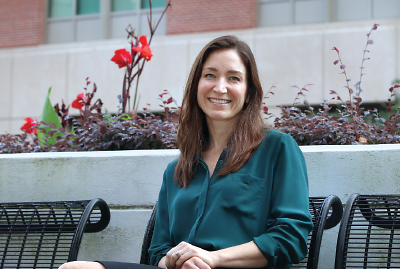Reducing Work-Family Conflict May Improve Mood in Physician Trainees
Abstract
Online assessments of men and women in the first year of internship suggest work-family conflict is associated with higher levels of depressive symptoms, particularly for women physicians.
First-year medical internship can be a stressful time for new doctors. Long hours, lack of autonomy, and isolation from family and friends can take a toll. Although 30 percent of physicians in training are estimated to experience elevated symptoms of depression, some evidence shows that this rate may be even higher in women physicians. A study published in JAMA Internal Medicine last October suggests that the pull between work responsibilities and family life may in part drive this disparity.

Constance Guille, M.D., is a psychiatrist at the Medical University of South Carolina, Charleston. Her research focuses on identifying risk factors for depression among medical trainees.
“Systemic modifications to alleviate conflict between work and family life may improve physician mental health and reduce the disproportionate depression disease burden for female physicians,” wrote psychiatrist Constance Guille, M.D., an associate professor of psychiatry and behavioral sciences at the Medical University of South Carolina and colleagues. “Given that depression among physicians is associated with poor patient care and career attrition, efforts to alleviate depression among physicians has the potential to reduce the negative consequences associated with this disease.”
For the study, Guille and colleagues invited medical students matching to residency programs across all specialties throughout the United States during the 2015-2016 academic year to complete online assessments two months prior to the start of the internship year and again at six months into the internship year. As part of these assessments, the participants were asked to report depressive symptoms using the Patient Health Questionnaire (PHQ-9) and the degree to which work responsibilities interfered with family life using the Work and Family Conflict Scale. (“Family” was defined from participants’ perspective.)
Of the 3,121 students entering internships who completed the initial survey, 2,108 completed the six-month survey. The authors found that while men and women experienced an increase in depressive symptoms and work-family conflict over the first six months of their internship year, the increase was higher in women. Men’s mean PHQ-9 depression scores were 2.68 before starting their internship and 5.17 after six months; women’s mean PHQ-9 depression scores were 2.79 preinternship and 5.68 after six months. PHQ-9 scores of 5 and 10 represent mild and moderate depression, respectively.
When work-family conflict was accounted for, the sex disparity in the increase in depressive symptoms decreased by 36 percent. These findings suggest that the positive association between work-family conflict may partly explain the sex disparity in depressive symptoms among training physicians.
Several teaching hospitals are piloting programs “designed to ease work-family conflict among physicians through free home-delivered meals, child care, and house cleaning,” Guille and colleagues wrote. But it remains unknown what impact such programs will have on the well-being of physicians and the patients they serve.
“The internship model hasn’t changed in 50 years,” Guille told Psychiatric News. Revising the model is long overdue because the makeup of who is in the workforce has changed considerably, she said.
Matthew Goldman, M.D, M.S., chief resident in the Department of Psychiatry at Columbia University, knows firsthand of the stress that medical trainees face. In August 2014, Goldman was just two months into his intern year as a psychiatry resident at Columbia when two internal medicine interns died by apparent suicide in New York City. One of the interns was Goldman’s friend and roommate.
As Goldman described in a Psychiatric News article, he has since become an advocate for improving conditions for other physician trainees (Psychiatric News, October 6, 2017).
“The medical internship is an experience that taxes any person’s normal, healthy coping skills to deal with tremendous stress,” said Goldman in an interview. Stressors such as work-family imbalance, lack of sleep, and worries about competence haven’t been explicitly shown to cause depression or suicide, he said, “but they can put people at risk.”
Goldman pointed out that many faculty and attending physicians “who are the models for trainees” also suffer from burnout and depression and are at increased risk for suicide.
“Studies that help us understand the epidemiology and risk factors for the effects of the resident’s experience will hopefully shed light on the need for addressing these well-being issues with the physician population as a whole,” he said.
Judy A. Sheaf, Ph.D., and Lisa M. Bellini, M.D., in a comment on the JAMA study, also emphasized the need for evidence-based strategies to improve physicians’ mental health. “We are still in the discovery stage regarding effective interventions,” wrote Sheaf and Bellini. “The study by Guille and colleagues provides a thoughtful step forward.”
Goldman added, “We want to research these problems by testing interventions because we’ll have a better sense of how to devote our limited resources to these problems. But by the same token, we also need to figure out shorter-term solutions to be able to better help those who are currently at risk.” ■



